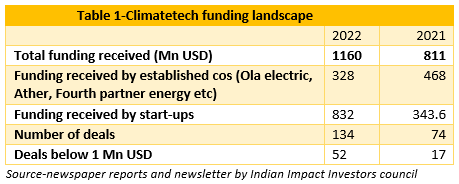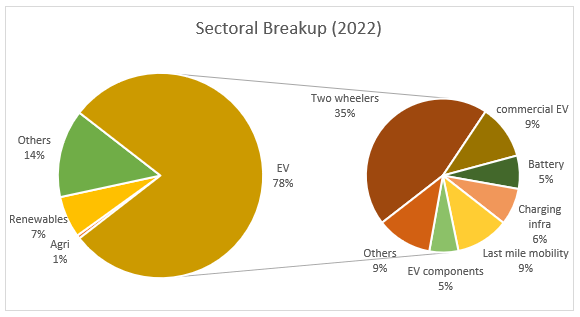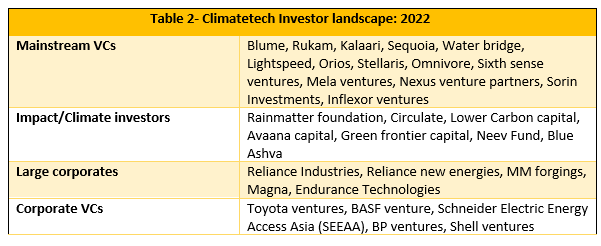
Despite funding winter, 2022 was a great year for Indian climate tech startups
In the middle of a funding slowdown, Indian climate-tech startups raised ~ 1.1 billion USD in 2022, representing a 40% increase over 2021. Although funding for growth-stage climate companies fell by about 30%, early-stage climate startups more than made up for it by raising nearly two and a half times as much capital in FY22 as they did in FY21 (Table 1).

The number of transactions nearly doubled from 74 to 134, primarily due to an increase in pre-seed and seed deals, a sign of expanding angel networks for such startups. Further, many well-known VC funds began investing in this sector and some global investors joined them.
Majority of the funding went to electric vehicles (EV), with the remainder going to solar, waste management, sustainable cooling and carbon offset/accounting platforms.

Here are more details on the funding trends in 2022.
Electric two wheelers raise lots of money, EV value chain startups get funded too
There is a lot of buzz surrounding EVs, particularly two-wheelers that have achieved cost competitiveness with their petrol/diesel powered cousins. No wonder that half of the funding for EV sector went to two-wheeler companies like Ather and Greaves mobility. Commercial EV startups got one fourth of the funding of the two wheelers, and most of it went to Altigreen and Euler motors.
Companies along the EV value chain gained from rising interest in electric vehicles. Several EV component manufacturers (Vecmocon, Rizel Auto, and Electra EV), EV purchase and financing solution providers (Turno, RevFin, and Three Wheels United) and EV charging solutions (Exponent energy, Statiq and Battery smart) raised capital. Furthermore, a number of battery startups including Offgrid Energy, Clean Electric, Cygni energy, E-TRNL energy also got funded.
While most segments were growing, last mile mobility companies faced tough funding environment, with fewer transactions and lower deal sizes. Except Yulu that raised $ 82 Mn from Magna, a Canadian automaker, most other deals were sub $ 10 Mn.
Renewable energy, Waste management are trudging along
Although small-scale solar is one of the most cost-effective ways to reduce India’s carbon footprints, it has lagged behind utility-scale solar due to a lack of financing for such installations.
This year, two solar financing platforms raised capital: Aerem, an NBFC that funds solar installation, and Solar Square, a rooftop installation company with plans to expand into solar financing. For utility scale solar, digitisation & remote monitoring is a big lever for efficiency improvement, and it was reflected in Reliance Industry’s acquisition of majority control of Sense Hawk, a solar software company. Green Hydrogen another renewable energy source, attracted investment as well. NewTrace and Hygenco, both hydrogen startups, raised capital.
Waste management companies typically get funded by impact investors, and it reflected in several plastic waste startups (Lucro, Deluxe, Ace recycling) raising capital from Circulate capital, an impact fund that invests in innovation to reduce plastic waste. However, it was also interesting to see Phool, a flower waste management start-up, raise funding from Sixth Sense Ventures, which is known for investing in consumer brands.
Waste management sector has several deep science startups that operate at the intersection of waste management and biotech, and these startups saw a lot of investor interest. Many of these including String Bio (converting greenhouse gases to protein), Green pod labs (extending the shelf life of fruits and vegetables), Loop worm (waste to animal feed) and sea six energy (see weeds/algae into value added products) attracted funding.
Sustainable agriculture, and plant-based protein see few deals
Agriculture contributes to climate change through deforestation and methane emitted by livestock and is also affected by climate events such as excess rain, heat that impact food production. However, investing in climate smart agriculture is still to gain momentum in India While Agri startups attracted over $ 500 Mn[1] in funding in 2022, less than 2 per cent went towards climate smart agriculture. Some of the startups that got funded include Eeki foods that is building large-scale, climate-proof farms across the country and Bioprime that is developing biobased solutions for crop protection and growth.
In the plant protein market, there were no significant funding announcements either, but startups like Shaka Harry and Good Mylk raised seed money.
While climate smart agri start-up funding remained muted, deal activity in sustainable cooling (low energy cooling that is also used for storage/transport of agri produce) picked up with number of companies (Ecozen, Tessol, Tan90) raising capital.
Carbon accounting and related startups made their funding debut
Carbon accounting and offset (carbon tech) refers to measuring the carbon emissions of a company/individual and then offsetting the same by investing in green projects. Carbon tech is very popular with VC investors globally, and has a number of unicorns such as Watershed and Clime works.
Given that India has committed to reducing the emission intensity of its GDP by 45% by 2030[2] carbon measurement and offset platforms are seeing investor interest. Furthermore, unlike typical climate startups that require large investments to set up manufacturing facilities, carbon accounting/offset platforms tend to offer software driven business models, that are already popular with venture capital investors. No wonder, a number of carbon accounting and carbon credit platforms raised capital, including carbon offset companies Clime and Varaha, real estate carbon footprint measurement platform Accacia and, Uniqus Consultech, an ESG accounting firm.
Climate tech is the new buzz word for VCs, corporate investors were excited too
In 2022, several mainstream venture capital firms (see table 2) invested in climate start-ups, primarily at the intersection of climate and software, or in battery related solutions. Furthermore, international investors such as Lower carbon capital, General catalyst also invested in climate.
Large corporates continue to scout for climate startups to fulfil their green ambitions. In 2022, three such acquisitions occurred with Endurance Technologies, an automotive component maker purchasing majority stake in Ion energy’s battery management division, Reliance energy and MM forging acquiring majority stake in solar square and Rizel auto respectively. Additionally corporate VC funds such as BP ventures, Toyota ventures, Qualcomm ventures and Shell ventures made investments in EV startups.

What is in store for the next year
Less than 5% of VC funding goes to climate startups, so there is plenty of room for funding to increase. The industry dynamics appear to be favourable, with rising demand for electric vehicles, renewable energy, corporate commitments to reduce their emissions and increased reporting requirements for ESG metrics. Favourable demand and increased investor interest bode well for climate startups, particularly those focused on electric mobility and those operating at the intersection of climate and software. Others have reason for optimism thanks to expanding angel investment networks and corporate venture capital.
You can download the list of climate-tech deals in 2022 here.
[1] https://www.moneycontrol.com/news/business/startup/goodbye-2022-indias-agritech-sector-in-full-bloom-as-valuations-shoot-up-amid-continued-investor-interest-9764971.html
[2] India has committed to reducing the carbon intensity of GDP by 45% by 2030 as compared to 2005

